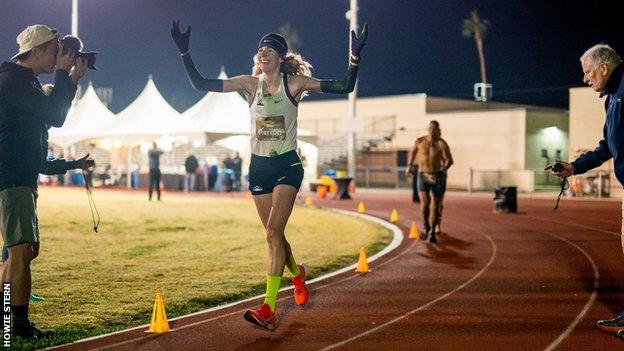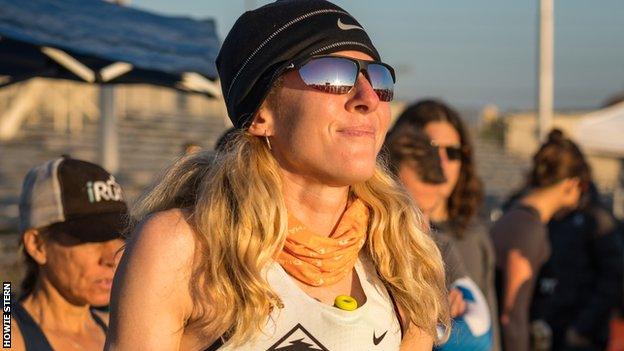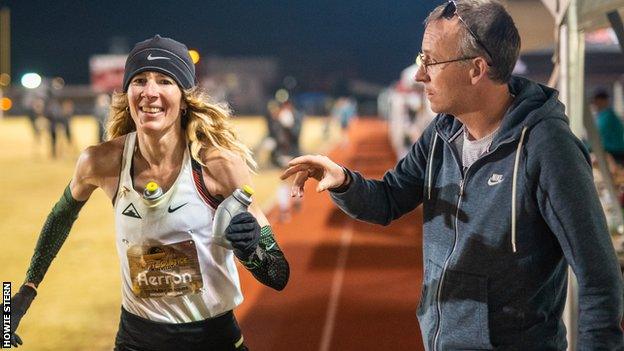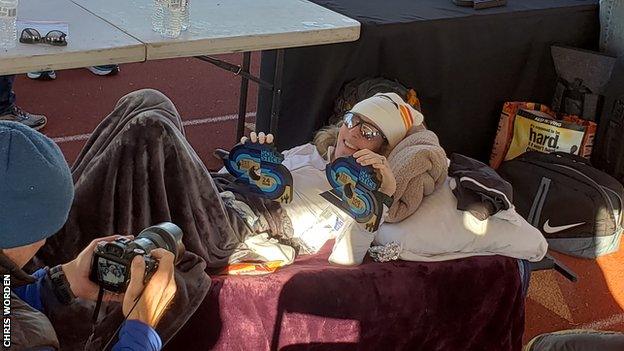Camille Herron: US ultrarunner who breaks world records fuelled on tacos and beer
- Published

Camille Herron celebrating victory in the Desert Solstice in Arizona earlier this month
"I walked a couple of laps while I ate Taco Bell and drank beer."
Camille Herron is no ordinary athlete. But then again, no ordinary athlete would run 655 and a half laps around a track for 24 hours.
Nor would they break two world records in doing so. Herron ran 162.9 miles in 24 hours and completed the first 100 miles in 13 hours and 25 minutes at December's Desert Solstice in Arizona, both new women's records on the track.
She ran five miles further than the man who finished in second place.
Herron's levels of endurance seem to have no bounds, yet for the average runner, even less than a quarter of the distance she covered would leave them in agony. But Herron doesn't seem to feel pain.
"I had seven stress fractures when I was a young athlete but I didn't know my bones were broken," she says. "I didn't think the pain was that bad."
Here, Herron - who celebrates her 37th birthday on Christmas Day - tells BBC Sport about her comparisons with fictional ballet dancer Billy Elliot, smiling through sleep deprivation and getting her sport to the Olympic Games.
'Taking a leap of faith' - from marathons to 100 miles
Fourteen years ago, Herron, who lives in Oklahoma, was a recreational runner who covered 70 miles a week. Her now-husband, Conor, was the serious athlete in the relationship yet on their first run together, she was able to go much further.
With his encouragement, her running career took off and she went on to win 21 marathons. But there was still energy in the tank and a new challenge was needed.
"It was a pretty scary thing to go from a marathon to running 100km, which is more than twice the distance," she says.

Camille Herron suffered seven stress fractures in her youth, without even feeling them
"I just had to take a leap of faith and believe that I could do it. I joked that it was like Billy Elliot doing ballet for the first time, it was this amazing feeling of 'I think I'm meant to do this'. It just felt incredible.
"I found my calling in life after taking this leap of faith and I believed that I could do it."
After underperforming at two shorter runs, she completed her first 100km race in 2015, and in doing so, broke a record held by Ann Trason, who is considered "the greatest ultrarunner of all time".
"That was the impetus that told me maybe I should continue doing this," she says.
Venturing into the unknown - and fighting off sleep
Herron now does between four and six ultras a year but 2018 was the year she decided to push her body harder than ever before.
The Desert Solstice Invitational sees 30 runners choose one of, or both, a 100 mile or 24 hour race completed simultaneously on a 400m track at a Phoenix high school.
From the moment she broke Trason's 100km record, Herron had her target set on smashing world records and this meet, held on 8-9 December, was her chance to do so.
"It was the furthest I had gone and I had to wrap my head around the idea of going for 24 hours, having to run through the night and troubleshoot these things that you don't experience on the shorter distances," she says.
"You're pushing through a period when your body wants to go to sleep, so I was venturing into the unknown doing the 24 hour race, but at the same time, it was an exciting thing to do something I had never done before."
Yet despite upping her race distances, Herron still trains like a marathon runner. Her longest training run prior to Desert Solstice was just 20.5 miles.
"The first couple of ultras that I did, I was trying to alter my training, trying to do longer training runs and cover more miles, but I found that it broke me down, made me really tired and made me underperform," she says.
"When I went back to the marathon structure, I felt better and that's when I started having all of my success. I obviously can't do 162 miles in training but it is amazing what your body can do on race day."
Fast food and zombies
Any long-distance runner knows the pain of hitting that invisible brick wall but when it hit Herron, she still had six more hours to run. She had watched the sun set but it was yet still to rise.
Thankfully, she and her husband had a contingency plan in place. It involved a dash to her favourite fast food restaurant.

Camille Herron being cheered on and given a drink by her husband Conor
"We decided that if I got to a point like that, I would try to take in more sustenance," she says. "They had actually gone to Taco Bell and got some double-decker tacos ready for me, and some beer.
"It felt like I was a zombie, like I was in a trance. This was my first time running the distance so I didn't really know what I was experiencing but I felt like my mind took over my legs."
Coca Cola and ginger beer, as well as the expected water and sports drinks, were also on the menu during the race, which changed direction every four hours to reduce boredom among the runners.
Well, not all the runners.
"Surprisingly, it was not that monotonous," Herron says. "We were surrounded by people and there was a lot of drama unfolding too, people were stopping and puking, going to the restroom.
"I'm a happy person, every picture of me from the race shows me smiling. I love to run."
Beating men and the Olympics
Having gone through three pairs of trainers and burned more than 10,000 calories, Herron had to be caught before she fell over from exhaustion when the 24 hours was up. She had to be wheeled around in a wheelchair yet she still had a smile on her face.
She won the race by some distance. Second place went to Jacob Jackson, who ran 157.58 miles.
"It was the most exciting thing that I beat a highly competitive men's field. I'm over the moon that it actually happened," she says.
"It really became mind over body and it feels like the further you go, the more it became an equaliser in the possibility of women beating men.

Camille Herron lies down while posing with her Desert Solstice trophies
"I feel like I am racing against myself but at the same time, the fact that I am against all these top men, it pushes me to raise the bar even higher."
Next up for Herron is the 24 Hour World Championships but she has an even bigger target on her agenda - to make ultrarunning an Olympic sport.
"I feel the Olympics is the next step for the sport to go more mainstream and for it to be more respected at the international level," she says.
"LA is hosting the 2028 Olympics and whoever hosts the Games gets to pick new events. If we could potentially get an event into those Games or maybe an exhibition event, I would love more people to be exposed to what we are doing because it is pretty incredible.
"I'm 36 now and at that point I will be 46, but women ultrarunners are going into their fifties, so I might be just at the beginning of my career!"